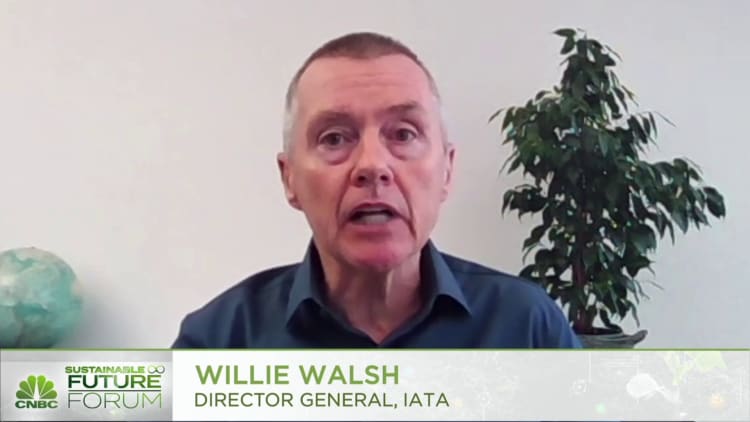Taxation is a blunt instrument, IATA chief Willie Walsh says

The aviation industry requires more carrot and less stick going forward to become more sustainable, according to the director general of the International Air Transport Association.
Speaking at CNBC’s Sustainable Future Forum on Friday, Willie Walsh was asked if subsidies and tax breaks to encourage investments into cleaner energy were more effective than firms or consumers being taxed for emitting higher levels of carbon.
“Quite honestly, all of the evidence that we have available shows that the carrot is far more effective than the stick,” Walsh replied.
Expanding on his point, Walsh went on to describe taxation as being “a very blunt instrument — in many cases, actually, it would make our industry less efficient.”
“I don’t think it would stop the number of planes flying, it would definitely reduce the number of people flying on the planes,” he added. “And that would be a silly thing to do.”
“What we need to do is to ensure that our planes are more full rather than less full, and to provide incentives to produce sustainable aviation fuels which will make a genuine impact on the environmental footprint of aviation.”
The European Union is currently looking to revise its energy taxation directive. Among other things, this would see both maritime and aviation fuels taxed.
Net-zero goals
In Oct. 2021, IATA member airlines passed a resolution “committing them to achieving net-zero carbon emissions from their operations by 2050.”
Given the fact it’s a crucial cog in the global economy, conversations about aviation and its effect on the environment will undoubtedly take place at the COP27 climate change conference being held in Sharm el-Sheikh, Egypt.
This is because despite its importance, aviation has been described by the World Wildlife Fund as “one of the fastest-growing sources of the greenhouse gas emissions driving global climate change.”
The WWF also says air travel is “currently the most carbon intensive activity an individual can make.”
During his appearance at the Sustainable Future Forum, IATA’s Walsh was asked how difficult it was for the airline industry to decarbonize compared to others.
“It’s very difficult … we account for about 2.4% of manmade CO2 today,” he said.
“We recognise however, as other industries decarbonize — and for many of them there are relatively simple pathways to decarbonization — our contribution will increase, because we will continue to be dependent on kerosene to power our aircraft,” he added.
“Now, technology will provide some solutions but … we’re not prepared to depend on something being developed in the future, we recognize we have to do something now.”
“So for us, the key to our goal is the use of sustainable aviation fuels — the science there is proven.”
“What we’ve got to do is turn what is very low levels of production of sustainable fuels into widespread availability.”
This, Walsh argued, represented a real opportunity not…
Read More: Taxation is a blunt instrument, IATA chief Willie Walsh says
